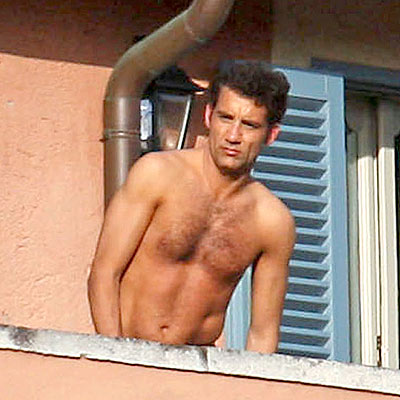In Which We Stumble Across Fifth Avenue
 Tuesday, February 24, 2009 at 9:25AM
Tuesday, February 24, 2009 at 9:25AM 
Integrity in the Face of Apocalypse
by Karina Wolf
While waiting to see The International, I caught a trailer for its cinematic Siamese twin, that other Clive Owen thriller, directed by Tony Gilroy and co-starring Julia Roberts’ thong. I also discovered that Tony Scott has remade The Taking of Pelham One Two Three featuring Denzel Washington in a role created by Walter Matthau and with John Travolta as the lead hijacker. We’re in an age of covers, retreads and reblogs, so I guess it makes sense that the great films of the 1970s are being remade and purveyed to the viewing public. I’m trying to understand why so few of them work.

Sixty or seventy minutes into The International, two bloodied men (Clive Owen and Brian O’Byrne) burst from the Guggenheim, stumble across Fifth Avenue and collapse in front of the Central Park reservoir. One man says to his enemy/accomplice: “I told you they’d never let you take me in,” and then expires.

This is exactly when The International should have begun. The story’s not a mystery – a failing bank kills off enemies to protect its interests (“control the debt, control everything” says one wicked banker). But by pivoting the climax to the beginning of the film at least we’d look forward to its great set piece, the Guggenheim’s demolition by artillery. Assassins cause the spiral structure to collapse like a failed soufflé. It should’ve been legendary, along the lines of Popeye Doyle’s car chase under the West Side BMT.

I went to the movie for exactly one reason: the preposterously named villain, the IBBC or “The International Bank of Business and Credit.” I wondered how the sloppiness of this writing – it’s like calling a food shop “the multinational grocery of edibles and potables” – found its way to screen. Admittedly, the movie is being dumped in the late winter netherworld of action and chick flicks, but there are still pleasures to be gleaned this season. Defiance works as a by the numbers tale of vengeance and redemption; in Taken, Liam Neeson breaks loose from his noble giant routine and proves pleasingly sadistic.

The International, though, aspires to more and fails harder; it’s one of those films where you can tell there’s a mind behind the misbegotten production. Director Tom Tykwer attracted acclaim by directing two films: he turned bank robbery into a breakneck version of Orpheus and Eurydice (Run, Lola, Run) and a Teutonic-style myth into a moving magical realist love story (The Princess and the Warrior). He followed up these jewels by directing as stand-in for Kieslowski (Heaven), and now, it seems, for Sydney Lumet. Neither role suits his operatic aesthetic.
In the 21st century, it’s Tony Gilroy, director of Michael Clayton and writer of the Bourne pictures, who seems to be the go-to guy for noir (he also directed Owen in the forthcoming Duplicity). Tykwer’s film aspires to Bourne’s relevance and multi-national reach. The movie is cast with a virtual Neapolitan of European actors: among them, Ulrich Thomsen (Festen) as a COO wading into a sinkhole of corruption and Armin Mueller-Stahl as an ex-Stasi officer gone good. The locations span New York to Lyon to Milan to Istanbul, although most exteriors echo the glass walled architecture of Berlin, where it was shot.

Clive Owen’s star-making performance was in a bad movie (Closer) but his iconography was formed in the ambitious Children of Men. Integrity in the face of the apocalypse – that’s his shtick. Surely, he’s the right player for an intelligent parable about greed in the New Depression. The problem isn’t with the acting, though, but the storytelling. We never learn why Owen’s character has been ejected from Scotland Yard and spends his time at Interpol dogging the shadowy bank. Naomi Watts’ role is so hazy it wasn’t until the credits that I realized she is an assistant DA.
The plot also suffers because it relies upon the luxuries of the virtual age. Instead of risk in the face of corruption, there are video conferences, televised rallies, and rather tame behaviors on the part of the Sicilian mafia. There is exactly one action sequence. Amid all the exposition, at least something is explained: the preposterous “IBBC” is a cover for an arms dealing Ponzi scheme—so the name is understandably fanciful. When Owen implores Mueller-Stahl, an insider, for an explanation for the bank’s corruption, he gets the answer, “that’s the difference between truth and fiction. Fiction has to make sense.” Not always.

All thrillers today aspire to be thrillers from the 1970s. Why not? Those films boasted political relevance and characters with depth. What’s great about those older films is that they’re not aiming for the cohesive truth of fiction; they’re quite comfortable with the aberrant behaviors of real life.

Easy Riders, Raging Bulls puts forth the hypothesis that after the extinction of the studio system, filmmakers were inventing storytelling all over again. Before the business of the blockbuster and the mandated three-act script, these films were feeling out their territory, like a blind man navigating an unfamiliar room. It’s worthwhile to consider the oddity of those films, their rough and poorly joined elements as the flaws that comprise their genius. A kind of cinematic wabi sabi.

In the 1970s films, there’s never a sense of ineluctable conclusion. Marathon Man’s set up is personal and idiosyncratic – a grad student has a chip on his shoulder because his father was blacklisted by McCarthy. The movie works because of a few set pieces, a terrific villain and a terribly neurotic protagonist. In fact, all those golden-age anti-heroes have some very creepy traits that inform their social do-gooding: Stockholm Syndrome (Three Days of the Condor), stalking (Marathon Man and Taxi Driver), corrosive workaholism (All The President’s Men, The Conversation) and megalomaniacal tendencies (The French Connection). Serpico’s dress sense, enunciation and interpersonal skills anticipate the reminted Joaquin Phoenix.

The movies of the 70s feature the anti-plot as well as the anti-hero. There are elliptical jumps and coincidences which we accept as reasonable. These hiccups don’t alienate the audience; quite the opposite, they’re the elements that make people return to the films.

When Robert Redford meets and kidnaps Faye Dunaway in Condor, it feels exactly right for the paranoid desperation of the character and the era. The abduction creates an uneasy crisis of conscience for the viewer: why is a rather perverse love affair – or government corruption (Watergate) or pathological eavesdropping (The Conversation) – thrilling to watch?

Many of the players in those 70s films are peripheral to the larger conflicts suggested by their stories – even those in law enforcement or intelligence often have no experience that prepares them for the enormity of the disorder. Nonetheless, the filmmakers find a uniquely personal resolution for each.
If only The International had taken these cues and created Owen’s character as an innocent discovering the corruption at the same time as the audience does. What’s more, there’s dramatic potential in finding sympathy for the villains. The IBBC’s misdeeds are like those of Bernie Madoff – Shakespearean in nature – in the sense that one individual thinks he can overcome corruption with more corruption. The bank directors aren’t evil; they’re equivocators who think another bad deal will bring everything back to black. These missed opportunities just send me back to my favorites, the originals. Yes, there is such a thing as an original in film, and it does have an aura of authenticity which today’s filmmakers imitate but can’t duplicate.
Karina Wolf is the senior contributor to This Recording. She lives in Manhattan, and she tumbls here.

"Defy Me" - Jessica Grace (mp3)
"Stop Looking At Me" - Jessica Grace (mp3)
"What Is It In You" - Jessica Grace (mp3)
Jessica Grace myspace

BEST OF THE WOLF
Karina on Tennessee Williams
Karina on Cher
Karina on Audrey Hepburn

Karina on Julia Cameron
Karina on the cinema of narcissism
Karina on Purple Rain

Karina on her summer reading
Karina on Indiana Jones
Karina on In Treatment

Karina on Thanksgiving
Karina on what makes her laugh
PREVIOUSLY ON THIS RECORDING
There is only one genius and this is him.
Or perhaps this is her.
Fancy taking it one way.






























